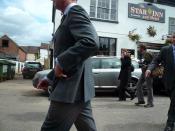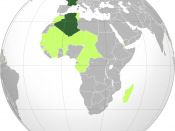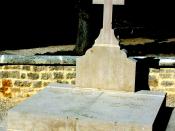Charles de Gaulle Eulogy
I met Charles in the hospital wing during WWI. He had just sustained his second of what would be three trips to the infirmary during that First World War. My job was to fix him up just enough so he could hobble back to the front lines. I'd say I did a pretty good job considering he could barely walk when he limped into the hospital, but unfortunately a week later he was wounded again and captured. We quickly became friends during his brief stay under my care.
Charles was liberated from the German POW camp at the end of the war. I awaited his arrival at the military base and happily greeted him. He told me he had written a book while in prison and wanted me to be the first to read it. I never told anyone this, but I read probably 5 times before giving the original copy back to Charles La discorde chez l'ennemi.
I couldn't believe my friend could write so brilliantly. I knew right there, Charles would be great. But, even I underestimated his significance to the world.
After the armistice he served on the staff of Gen. Maxime Weygand's military mission to Poland and then taught military history at Saint-Cyr. I was happy to be his assistant, doctor, and most importantly friend during the short time between wars. Charles was great at cheering me up and a little too good at making me smile. He was my best and closest friend. Charles continued to write various books and articles on military subjects that showed his true greatness and imagination as a writer. I read every one of his writings and even added some input. Although he never used any of my input, I know he appreciated my effort.
At the outbreak of World War II, Charles was a colonel but was quickly promoted to brigadier general and then to undersecretary of state for war on June 6, 1940. Charles was one of the few in the cabinet to resist surrender and to propose that the government withdraw if necessary to North Africa to continue the struggle. Charles demonstrated more loyalty to his country and friends than I had ever seen before. We had an unexplainable understanding and trust for each other. When Marshal Petain, who was committed to an armistice with the Germans, became premier, de Gaulle left for London. He was not deserting his country but rather making himself most useful to the resistance. The French needed a leader to regain its independence. He soon became the very symbol of the entire Resistance, even though the exiled armed forces at his disposal were few in number. In July 1940 a French court martial sentenced Charles to death for treason. This, however, did not stop him from leading the French to retake their country with the help of the Americans.
After the war, Charles was unanimously elected president of the provisional government in October 1945. I continued to stay in the background helping him every step of the way. I may not have know much about military strategy or running a country, but that didn't stop me from making a difference. Charles did not approve of the constitution of the Fourth Republic, adopted in October 1946, and therefore returned home to write his memoirs. One flaw of his was that he was very stubborn. He was an intensely determined person and always kept the good of the French people in mind.
Without Charles, the Fourth Republic collapsed as a result of military disasters in Indochina and Algeria. On June 1, 1958, the National Assembly named Charles premier and granted him wide emergency powers, including the right to prepare a new constitution to be submitted to a popular referendum. He dropped everything he was doing and rushed to the aid of his country. Charles was voted first president of the Fifth Republic. He led his country through the Algerian crisis by granting Algeria its freedom in 1962, and the student demonstrations of 1968. Charles resigned in 1969 when he felt his leadership wasn't best for the country. He died a year later at his home in Colombey-les-Deux-Eglises working on his memoirs. There is not much else to say about Charles. He was a great man, and we will all miss him.


